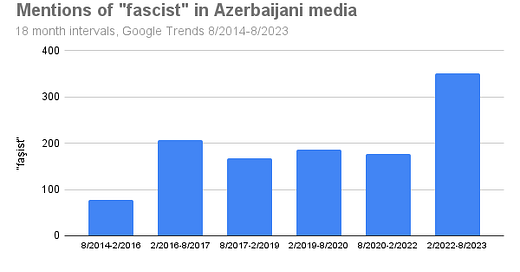Azerbaijan ramped up denazification rhetoric after Russia invaded Ukraine
Aliyev's pretext for war in Armenia has echoed Putin's rhetoric time and time again.
Two years after the frozen conflict in Nagorno Karabakh reignited into an open war the violence between Azerbaijan and Armenia has started once again. And predictably, US discourse has devolved into its only mode for understanding every single conflict in the world: figuring out which side are the Nazis. US media has already launched some initial salvos…
Keep reading with a 7-day free trial
Subscribe to Carl Beijer to keep reading this post and get 7 days of free access to the full post archives.




